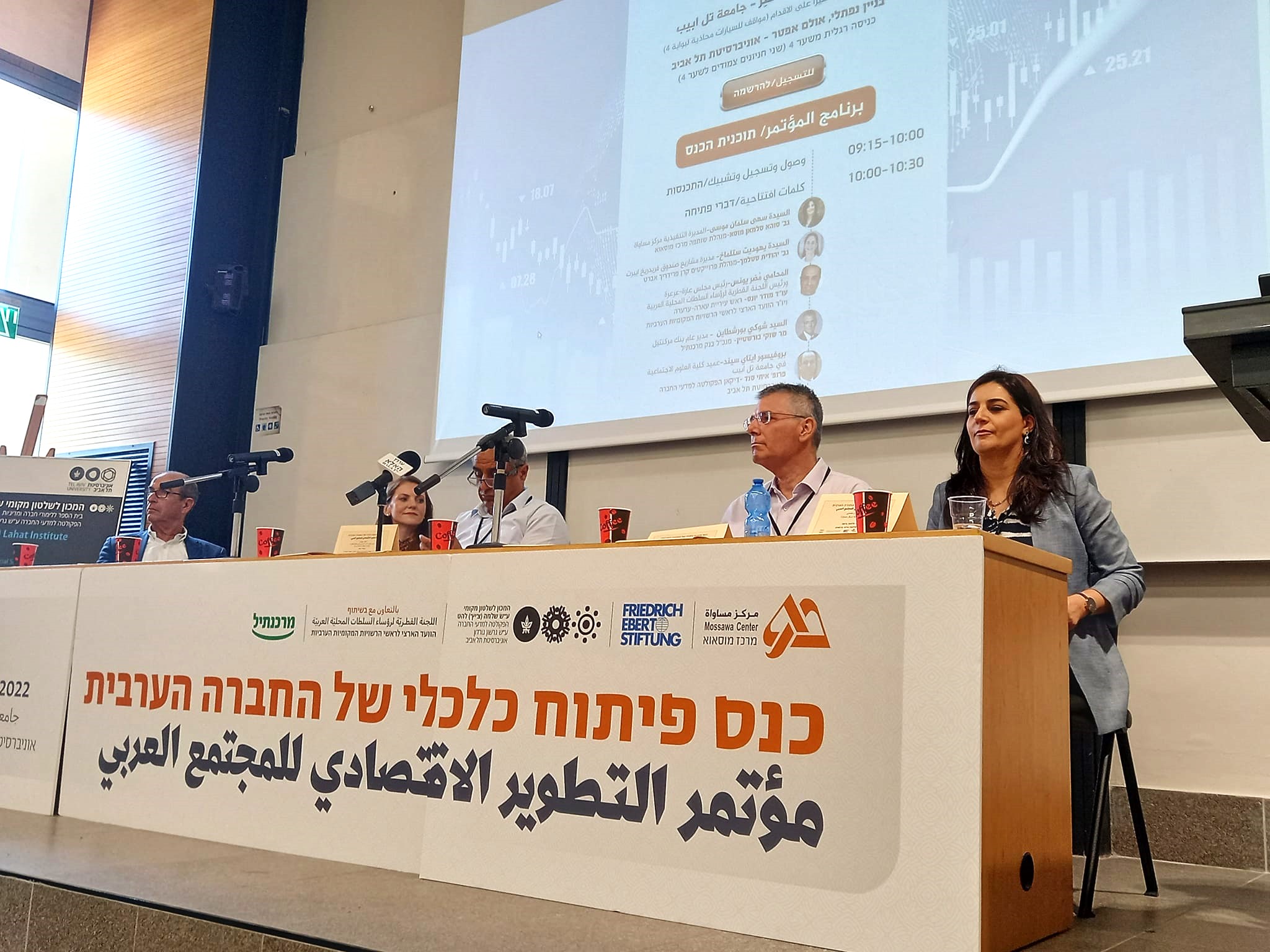
On July 21st, the Mossawa Center hosted the Socio-Economic Development Conference in the historical Naftali Building of Tel Aviv University. In cooperation with the Friedrich Ebert Foundation, the Institute of Local Government at Tel Aviv University, and the National Committee of Heads of Arab Local Authorities, the conference aimed to address national inequality and discrimination in the state’s budgeting.
With over 150 attendees, the conference was a great success and a much-needed stepping stone in raising public discourse on economic discrimination during the upcoming Israeli election. The conference provided an opportunity to advocate and monitor the allocation of state budgets to the Palestinian-Arab community. With the government’s continued push for discriminatory legislation and refusal to allocate equitable funding, Palestinian-Arab communities are increasingly underfunded and stifled.
Mayors, ministers, lawyers, academics, and politicians attended and took an active part in presenting proposals for flourishing the economy of the Palestinian-Arab community and furthering discourse on the issue.
“The State of Israel will lose more than 454 billion NIS by the year 2060 if Arab and Haridi citizens do not join the job market” stated Mr. Yogev Gordos, Director of the Budget Department at the Ministry of Treasury during his introductory speech.
The conference began with an opening remarks panel by the Mossawa Center’s Executive Director, Suha Salman Mousa, along with representatives from all cooperating partners. In the opening remarks, the panelists presented the issue of budgeting discrimination in general terms and introduced the three following thematic panels.
Among the things addressed were: the need to work with and focus on youth; the unrealized budgets promised by the government for Palestinian-Arab communities; the need to improve economic development in the Palestinian-Arab community; the diminishing state of public transport; the government’s role in stripping local authorities of power; Mercantile Bank’s commitment to the Palestinian-Arab community; Palestinian Arabs’ increasing presence in universities; and lastly the importance of not just reaching equality, but going beyond and achieving equitability.
Monitoring and Implementation Government Budgets Allocated for Economic Development in Palestinian-Arab Society
The first panel examined the budgets allocated by the state to Palestinian-Arab localities and the shortcomings. Among the things addressed were: the Palestinian-Arab communities’ budget and infrastructural needs, and the delayed budget transfers of Government Decision 550.
Minister of Transportation, MK Mirav Michaeli, who attended the conference, was asked about the important role the Ministry of Transportation has in closing the inequality gaps in public transportation in Palestinian-Arab localities, and the Labor Party’s future plans for developing the transportation infrastructure.
Mr. Yogev Gardos was asked about the need to integrate Palestinian Arabs in areas they are behind in the country; the ways Israel is behind other countries (and how Palestinian Arabs are behind the rest of the population), and the need to revitalize Palestinian-Arab small businesses and economy.
Director of the Ministry of Economy and Industry, Dr. Ron Malka, discussed Palestinian-Arab women’s issues and gender inequality; the small amount of money that was transferred out of the proposed budgets to Palestinian-Arab localities, and how little the amount actually helps; the suffering and violence that has become a normal part of life for many Palestinian-Arabs; and lastly the government’s increasing efforts in pushing Palestinian-Arabs out of the Negev/Naqab.
The Palestinian-Arab Local Authority as an Initiator of Sustainable Economic Development
The second panel discussed the role Palestinian-Arab local authorities have in achieving sustainable economic development in their localities. Speakers discussed potential industrial zones’ instrumental role in economic development, and how there are legislative hurdles preventing the development of industrial zones in numerous Palestinian-Arab localities, as well as the importance of promoting tourism in Palestinian-Arab localities such as Rahat to generate essential municipal revenue.
Palestinian-Arab Youth as Potential for Economic Development of the Community
The last panel discussed the potential Palestinian-Arab youth have for future economic alleviation. Among the things addressed during the panel were: the lack of opportunities for Palestinian-Arab youth and the dramatic byproducts that leads to; the ever-growing struggle of Palestinian-Arab youth to integrate into society and enter the workforce; Palestinian Arabs’ underrepresentation in schools and vocational training institutions; the Ministry of Education’s required role in solving educational disparity and their unwillingness to do so.
The conference dealt with major five issues: Employment, Industrial Zones, Housing, Transportation, and Youth. The Mossawa center will keep monitoring government efforts and budgets in cooperation with Local councils and civil society partners.









